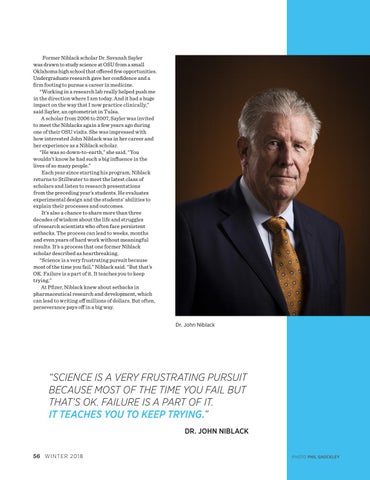Former Niblack scholar Dr. Savanah Sayler was drawn to study science at OSU from a small Oklahoma high school that offered few opportunities. Undergraduate research gave her confidence and a firm footing to pursue a career in medicine. “Working in a research lab really helped push me in the direction where I am today. And it had a huge impact on the way that I now practice clinically,” said Sayler, an optometrist in Tulsa. A scholar from 2006 to 2007, Sayler was invited to meet the Niblacks again a few years ago during one of their OSU visits. She was impressed with how interested John Niblack was in her career and her experience as a Niblack scholar. “He was so down-to-earth,” she said. “You wouldn’t know he had such a big influence in the lives of so many people.” Each year since starting his program, Niblack returns to Stillwater to meet the latest class of scholars and listen to research presentations from the preceding year’s students. He evaluates experimental design and the students’ abilities to explain their processes and outcomes. It’s also a chance to share more than three decades of wisdom about the life and struggles of research scientists who often face persistent setbacks. The process can lead to weeks, months and even years of hard work without meaningful results. It’s a process that one former Niblack scholar described as heartbreaking. “Science is a very frustrating pursuit because most of the time you fail,” Niblack said. “But that’s OK. Failure is a part of it. It teaches you to keep trying.” At Pfizer, Niblack knew about setbacks in pharmaceutical research and development, which can lead to writing off millions of dollars. But often, perseverance pays off in a big way. Dr. John Niblack
“SCIENCE IS A VERY FRUSTRATING PURSUIT BECAUSE MOST OF THE TIME YOU FAIL BUT THAT’S OK. FAILURE IS A PART OF IT. IT TEACHES YOU TO KEEP TRYING.” DR. JOHN NIBLACK 56 W I N T E R 2 0 1 8
PHOTO PHIL SHOCKLEY
